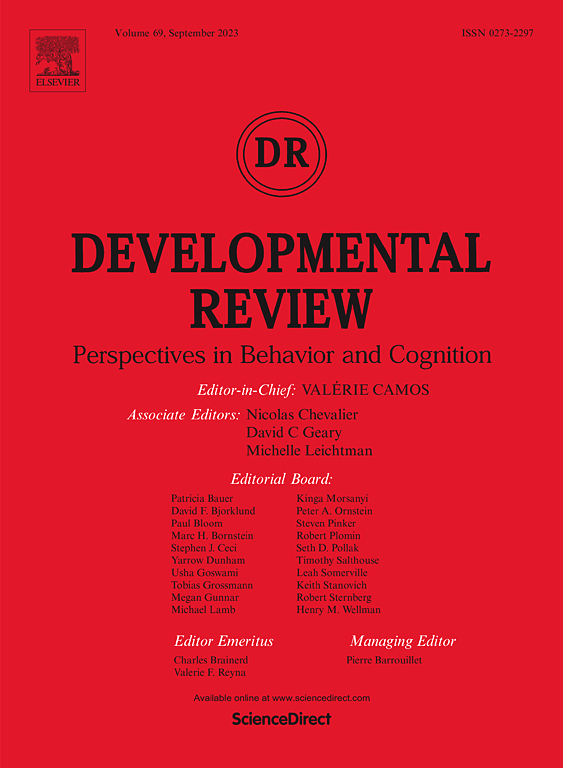推进暴力暴露研究的跨国生态系统框架
IF 5.6
1区 心理学
Q1 PSYCHOLOGY, DEVELOPMENTAL
引用次数: 0
摘要
学者们强调需要整合来自更多样化背景和跨越国界的地方现实的研究,从而为发展科学的全球视角提供信息。随着多国发展研究的增加,需要进一步注意的一个领域是拥有更大权力的国家如何影响其他国家青年的当地现实。公共安全、不安全和青年暴力领域表明了与外国政府政策干预形成的当地条件有关的重要问题。在本文中,我们借鉴了多国研究、社区暴力暴露研究、布朗芬布伦纳的人类发展生态模型以及美国和中美洲之间的政策。以中美洲为例,我们的分析考察了美国的跨国政府政策是如何对洪都拉斯青年在暴力和安全方面的近端体验产生现实影响的远端过程。我们提出了一个跨国生态系统框架,用于推进关于暴力的发展理论和研究,将生态系统的国家内部应用扩展到国家之间的模型,以解释这些跨国的、远端过程。我们总结了理论和研究的意义和应用,目的是促进对特定情境和一般发展过程和结果的更全面和准确的理解。本文章由计算机程序翻译,如有差异,请以英文原文为准。

Advancing a transnational ecological systems framework for research on exposure to violence
Scholars have underscored the need to integrate research from more diverse contexts and local realities across national borders to inform global perspectives on developmental science. As multination developmental studies have increased, one area requiring further attention is the ways in which countries that wield greater power influence the local realities of youth in other countries. The domain of public safety, insecurity, and violence for youth evinces important issues related to local conditions shaped by foreign government policy interventions. In this paper we draw from multinational studies, research on exposure to community violence, Bronfenbrenner’s ecological model of human development, and policy between the United States and Central America. Utilizing Central America as a case study, our analysis examines how transnational governmental policies of the US are distal processes that have real-life impacts on youth’s proximal experiences with violence and safety in Honduras. We propose a transnational ecological systems framework for advancing developmental theory and research on violence to expand from a within country application of ecological systems to a between country model to account for these transnational, distal processes. We conclude with theoretical and research implications and applications with the aim of advancing a more comprehensive and accurate understanding of context-specific and general developmental processes and outcomes.
求助全文
通过发布文献求助,成功后即可免费获取论文全文。
去求助
来源期刊

Developmental Review
PSYCHOLOGY, DEVELOPMENTAL-
CiteScore
11.00
自引率
3.00%
发文量
27
审稿时长
51 days
期刊介绍:
Presenting research that bears on important conceptual issues in developmental psychology, Developmental Review: Perspectives in Behavior and Cognition provides child and developmental, child clinical, and educational psychologists with authoritative articles that reflect current thinking and cover significant scientific developments. The journal emphasizes human developmental processes and gives particular attention to issues relevant to child developmental psychology. The research concerns issues with important implications for the fields of pediatrics, psychiatry, and education, and increases the understanding of socialization processes.
 求助内容:
求助内容: 应助结果提醒方式:
应助结果提醒方式:


